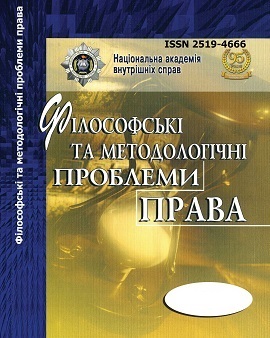Praxiology of Law as the Constituent of Philosophy of Law
Abstract
The basic lines of praxiology of law (as sciences about activity of legal man, that is about legal activity) are exposed. The special attention is spared to the mutual copulas of legal praxiology with other philosophical-legal disciplines. Legal praxiology is the constituent of legal anthropology, and here legal activity is the substantial factor of development of man as a
legal creature. A legal axiology can be understood as part of legal praxiology, in fact research of the aims of legal activity and their copulas with legal values (that checked up and improved in the process of legal activity) must take into account in industry of legal praxiology. Legal praxiology has close copulas with legal ontology: legal existence is created and developed by a man in the process of his legal activity, and here actual legal activity comes true in space of present legal existence, thus, depends on it. Legal praxiology is organically related also to the legal gnosiology – cognitive activity in a legal sphere is the constituent of legal activity in general, and a theory of legal activity is the result of corresponding cognitive procedures. Thus, legal praxiology comes forward as a necessary constituent of legal philosophy as a single dialectical system.
Downloads
Abstract views: 1349 PDF Downloads: 551
Copyright (c) 2018 Philosophical and Methodological Problems of Law

This work is licensed under a Creative Commons Attribution-NonCommercial-NoDerivatives 4.0 International License.
- Authors reserve the right to authorship of their own work and transfer to the magazine the right of the first publication of this work under the terms of the Creative Commons Attribution License, which allows other persons to freely distribute published work with mandatory reference to authors of the original work and the first publication of an article in this magazine.
- Authors have the right to enter into separate additional agreements on non-exclusive dissemination of the work in the form in which it was published in the journal (for example, to post an article in the institution's repository or to publish as part of a monograph), provided that the link to the first publication of the work in this journal is maintained.
- The journal's policy allows and encourages the posting of articles by authors on the Internet (for example, in electronic storehouses of institutions or on personal websites), both before the submission of this manuscript to the editorial office and during its editorial processing, as this contributes to the creation of a productive scientific discussion and positively affects the efficiency and dynamics of citing the published work.




